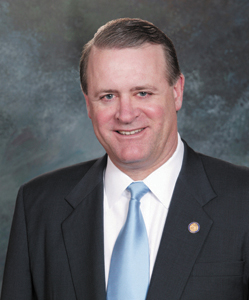STRAIGHT FROM THE SENATE
 STATE REVENUE HITS TARGET, BUT LAGS 2009 BY $14 MILLION
STATE REVENUE HITS TARGET, BUT LAGS 2009 BY $14 MILLION
Frugality, reserves help protect most K-12 funds, vital state programs; Indiana fares better than many states as 2011-12 budget writing begins
STATEHOUSE – Indiana State Budget Agency officials recently reported the state’s April revenue exceeded the forecast, but was $14 million lower than the same period last year.
Exceeding the forecast is welcome news, but it is important to keep the numbers in perspective. The forecast made last December was compiled to account for declining revenues resulting from the national recession. Indiana met the forecast, but the forecast itself was less than positive.
A better measure of where we stand can be found by reviewing actual year-to-date revenues.
Due to the ongoing national recession, state revenue collections in the current fiscal year have been below the budget plan for nine of the 10 months. Such shortfalls have consumed nearly half of the state’s $1.3 billion in reserves in just the first 10 months of the two-year budget cycle.
Indiana has responded to these shortfalls by flatlining state employee wages and freezing hiring of new employees for all but essential personnel. Each state agency has already cut expenses by 10 percent, with additional cuts now ordered for the next fiscal year. The state has also postponed several construction projects, significantly reduced the number of government-owned vehicles and trimmed state payrolls. Indiana now has the fewest state employees on its payroll since 1982.
Slight cuts were made to K-12 and higher education budgets. These were cuts of last resort, but ultimately they could not be avoided as revenues continued to decline, since education makes up more than half the budget.
Schools now have more flexibility with money already collected and on hand. A new state law offers districts an opportunity to claim an additional 5 percent from their capital projects, maintenance and transportation funds to use for general operations – if they agree to freeze pay for staff, with exceptions for regular teacher raises based on experience and new degrees. This measure could provide up to $82 million statewide to help prevent teacher layoffs and preserve instructional programs.
Other cost-saving efficiencies are being explored. Republican legislators have worked hard to protect our state’s cash reserves from unnecessary spending. These reserves are now needed to help fill budget gaps caused by the continuing economic downturn.
According to the state’s monthly revenue report, April 2010 collections from all sources totaled $1.4 billion, a drop of 1 percent from the same period last year. Sales tax collections were up from the same period last year, while individual income taxes dropped.
Officials noted that total tax collections for April were the lowest since 2004. Collections for May and June would have to exceed the same period last year by 2.5 times in order to meet the budget forecast for the current fiscal year.
This latest revenue report is a reminder that even though experts say the U.S. economy began rebounding from the recession sometime in the third quarter of 2009, progress will be slow. Officials with the National Conference of State Legislatures (NCSL) say state finances are not expected to recover for at least two years.
In fact, according to the National Governors Association, states foresee fiscal year 2011 – which starts for most states July 1, 2010 – to be the most difficult since the Great Depression. Few see fiscal year 2012 as being much better:
•At least 38 states and Puerto Rico are dealing with fiscal year 2011 gaps that total $89 billion, nearly $34 billion more than the estimate just four months ago; and
•Twenty-four states and Puerto Rico report gaps of 10 percent or more in their general fund budgets.
This news further validates previous budgetary practices employed by Indiana during the past few years. By achieving three consecutive balanced budgets and resisting temptations to spend reserves, the Hoosier state continues to be in a better financial position than most. Stateline.org reports states near Indiana are considering major cuts in education and other state services:
•Pennsylvania Gov. Ed Rendell (D) is pushing to eliminate 80 percent of the state’s school districts, consolidating school administrations to reduce costs;
•Michigan Gov. Jennifer Granholm (D) wants to eliminate more than half the state’s agencies, in addition to cutting off public money for Michigan’s state fair. The fair is expected to continue, but state taxpayers won’t make up for shortfalls as in the past; and
•Next year, Minnesota’s projected budget deficit will be twice as large as its previous all-time high.
In response to Indiana’s continued revenue shortfalls, Gov. Mitch Daniels recently announced state agencies will be asked to spend 15 percent less than budgeted in the next fiscal year. This will be achieved by continuing the 10 percent reductions already made this year, and finding an additional 5 percent in savings next year.
Clearly, we legislators have our work cut out for us as planning begins for the next legislative session and building a new biennial budget.
Sen. David Long (R-Fort Wayne) is President Pro Tem of the Indiana Senate. He serves District 16, which includes portions of Fort Wayne.
- THANK YOU INDIANA, IT HAS BEEN AN HONOR – Straight From The Senate - November 9, 2018
- CYBERSECURITY AWARENESS MONTH – Straight From The Senate - October 26, 2018
- INDIANA’S ECONOMY IS THRIVING – Straight From The Senate - October 12, 2018


